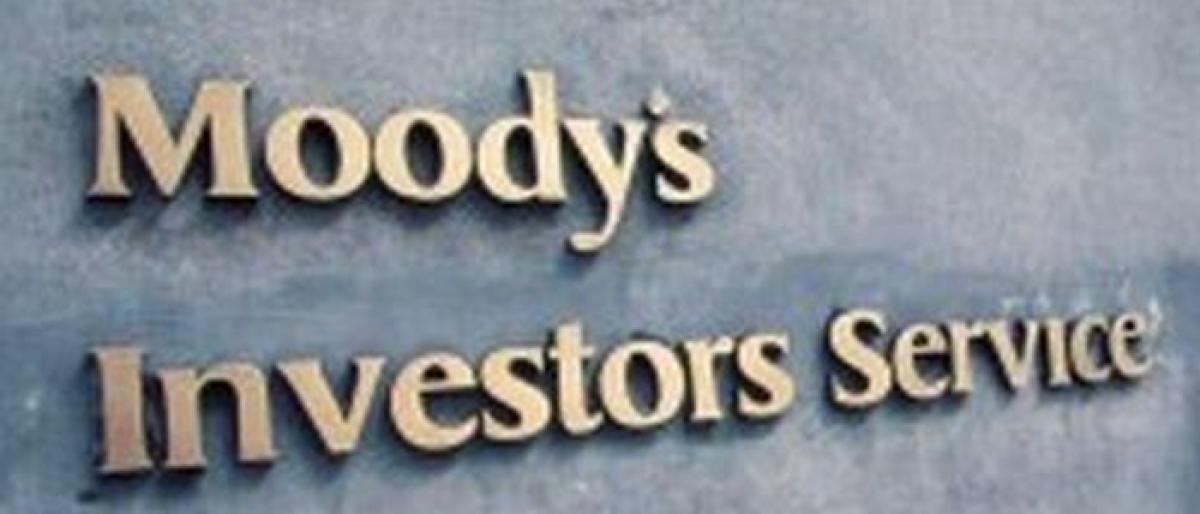Live
- Horoscope Today, December 26, 2024: Check Here for Astrological Daily Predictions
- KTR Condemns Arrest of Errolla Srinivas, Calls it an Unjust Act
- Meeting of Film Industry Leaders with CM Revanth Reddy
- Heavy Rush of Devotees at Tirumala Temple
- Belagavi meet is Jai Bapu-Jai Bhim-Jai Samvidhan convention
- Four Karnataka soldiers martyred in J&K Army vehicle accident
- Madhya Pradesh to translocate 14 tigers to Gujarat, Chhattisgarh, Odisha
- Shiva Rajkumar gets cancerous bladder removed in US
- Modi: Ambedkar's vision neglected by Congress
- With holiday mood on a high, hotel room demand peaks in Hampi
Just In

Moodys Investors Service on Tuesday said RBI boards decision to extend the timeline for banks to implement Basel 3 guidelines is credit negative for public sector lenders Also, the decision to restructure stressed micro, small and medium enterprises MSME loans of up to Rs 25 crore also has the potential for having negative implications for the credit profiles of Indian banks, the USbased r
New Delhi: Moody's Investors Service on Tuesday said RBI board's decision to extend the timeline for banks to implement Basel 3 guidelines is “credit negative” for public sector lenders. Also, the decision to restructure stressed micro, small and medium enterprises (MSME) loans of up to Rs 25 crore also has the potential for having negative implications for the credit profiles of Indian banks, the US-based rating agency said.
Amid growing tension between the government and the central bank, the RBI board met Monday and discussed issues to boost funding to MSMEs and ease capital pressure on banks. At the nine-hour long marathon meeting, the board advised that the RBI should consider a scheme for restructuring of stressed standard assets of MSME borrowers with aggregate credit facilities of up to Rs 25 crore, subject to such conditions as are necessary for ensuring financial stability.
“While more details are awaited, this approach has the potential for negative implications for the credit profiles of Indian banks,” Moody's Investors Service Vice President (Financial Institutions Group) Srikanth Vadlamani said in a statement.
The RBI board, while deciding to retain the capital adequacy requirement for banks at 9 per cent, agreed to extend the transition period for implementing the last tranche of 0.625 per cent under the capital conservation buffer (CCB), by one year - up to March 31, 2020.
CCB currently stands at 1.875 per cent and remaining 0.625 per cent was to be met by March 2019, as per the deadline fixed by the RBI. “The decision to extend the timeline for the full implementation of Basel 3 guidelines by a year is a credit negative for Indian public sector banks,” Vadlamani said.
It expects that all public sector banks would have a core equity tier 1 (CET1) ratio of at least 8 per cent by the end of March 2019, based on the government's commitment that it would capitalise all these banks to a level sufficient to meet the minimum regulatory capital norms. “With the regulatory timelines now extended, it may be a case that at least some of the rated public sector banks' CET1 ratios over the next 12 months would be lower than what we currently expect,” he said.
On restructuring of stressed MSME loans, Moody's said the track record of such asset classification, when seen over the last few years in India, has shown that they have “largely been unsuccessful in addressing the underlying stress”.
On the contrary, keeping stressed loans in the standard category has led to an underestimation of the extent of underlying asset quality issues by bank managements, and consequently the severity of the actions that they need to take to address the issue, Vadlamani added.

© 2024 Hyderabad Media House Limited/The Hans India. All rights reserved. Powered by hocalwire.com







